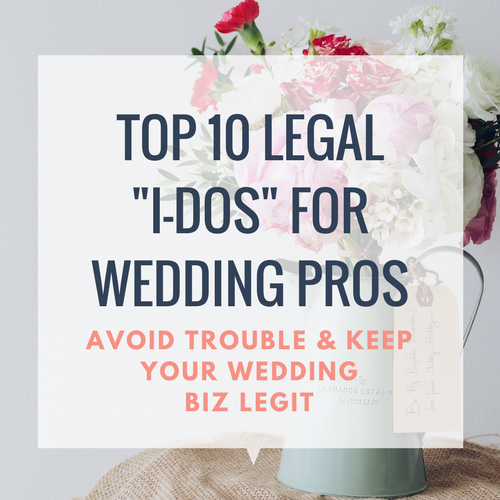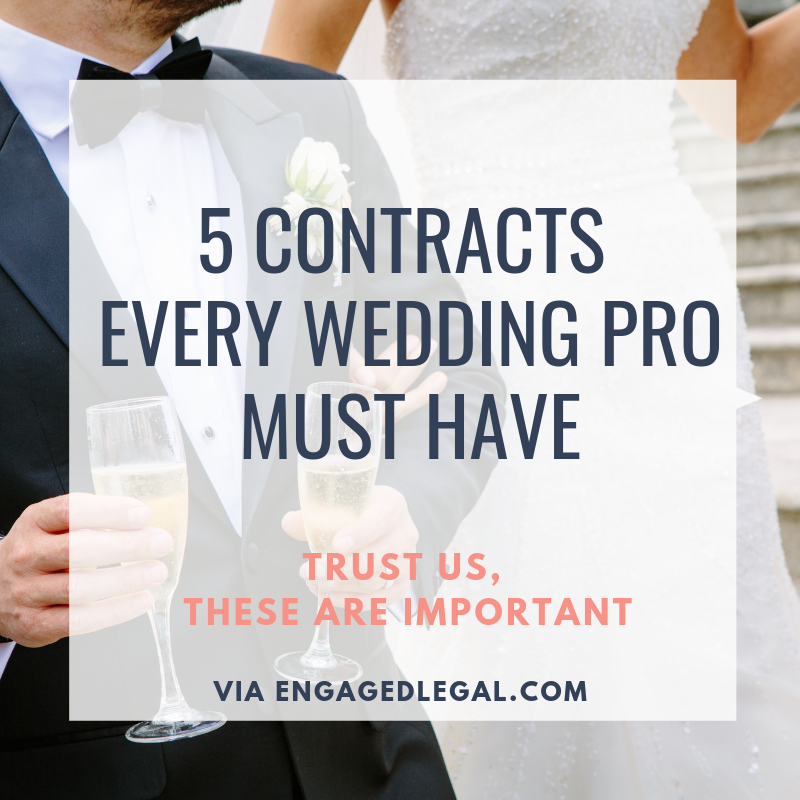What Creatives Must Learn from the Hayley Paige / JLM situation
/If you’re not living under a rock, you have probably seen what’s going on between wedding-dress-designer-darling Hayley Paige and (current? former?) employer and/ or parent label JLM Couture.
Full disclosure: I totally love Hayley Paige dresses. I tried a few on. I adore her.
But I’m also a member of the legal community, and I want to educate my wedding pro folks on what happened and why it’s unfolding the way it is. Because while it’s a yucky-feeling situation, there are a lot of things to learn here.
As a background:
Hayley Paige, aka Hayley Paige Gutman, signed an employment agreement with JLM Couture in 2011, when they began backing the wedding gown designer. She has since launched 9 lines under the JLM agreement.
JLM Couture claims that in the Employee Agreement signed by Hayley, she agreed to let the company trademark rights to "Hayley Paige" and all derivatives (the company later filed 10 trademark registrations containing the designer's name or variations of her name).
The contract also extended to include the social media account @misshayleypaige and other accounts on Facebook, Pinterest, Twitter and YouTube.
Things got spicy in late 2019, when Hayley changed the bio section of the @misshayleypaige Instagram to read "personal & creative account” (which JLM Couture claims is a breach of their agreement);
Contract negotiations ensued.
Monday, she resigned from the company after contract negotiations fell through. She stated she was attempting to achieve a deal that did not feel “so one-sided” in regards to what she could share on her social media accounts.
JLM filed for and was granted a “TRO”— a “temporary restraining order”— to access and gain control of all of Hayley’s social media accounts, shutting her out. She was forced to hand over passwords for all of her accounts, which also contain personal photos and messages.
Wait, WHAT???
There’s a lot to learn here for creatives, especially anyone who has worked as an employee, a contractor, or with a larger brand (that should be…. everyone?)
Let’s dive in.
1. Employment contracts in the creative industry typically transfer all IP to the employer
Hayley was hired on by the label to be a designer. She produced 9 hit lines for them; they sunk (probably) millions of dollars into the development of that brand and those dress lines. When she was 25, she signed her employment agreement, which JLM asserts had an IP transfer clause, which means they own the trademark in her name, all of her designs, and anything she created for or in conjunction with her dress lines.
Say what?
Let’s break it down.
Most employment agreements transfer all work product— i.e. anything related to your performance of your job— to the employer. This can be slightly different under each employment agreement, but typically, we see an assignment clause that looks something like this:
You acknowledge that during the term of employment, you may conceive of, discover, invent or create inventions, improvements, new contributions, literary property, material, ideas and discoveries, whether patentable or copyrightable or not (all of the foregoing being collectively referred to herein as “Work Product”), and that various business opportunities shall be presented to you by reason of your employment by the Company. “Work Product” shall mean all intellectual property rights, including all Trade Secrets, U.S. and international copyrights, patentable inventions, and other intellectual property rights in any programming, documentation, technology or other work product that relates to the Employer. You acknowledge that all of the foregoing shall be owned by and belong exclusively to the Company and that you shall have no personal interest therein, provided that they are either related in any manner to the business (commercial or experimental) of the Company, or are, in the case of Work Product, conceived or made on the Company’s time or with the use of the Company’s facilities or materials, or, in the case of business opportunities, are presented to you for the possible interest or participation of the Company. If the Work Product contains any materials, programming or intellectual property rights that you conceived or developed prior to, and independent of, your work for the Employer, you agree to point out the pre-existing items to the Employer and grant the Employer a worldwide, unrestricted, royalty-free right, including the right to sublicense such items.
I highlighted some of the more important parts, but you get the drift. Believe it or not, this is very common, and even something that is a “best practice” for an employer.
When working on the company side, I typically advise my client companies to make these as broad as possible to protect against IP issues. We do this to ensure there are no potential lawsuits down the line for using the designs, materials, or other work product they paid someone to make— and may have invested time, money, and resources helping to develop.
Example: If you own a photography studio, you need to make sure all of your employees and independent contractors agree to transfer / "assign” all IP to you— meaning they must assign the copyrights in the photos. Otherwise, you technically can’t share them with the client or use them in your book of work (copyright rights to “duplication” or “display” would be affected here).
COMPARE: When working on the employee/ contractor side, I make sure this is as narrow as possible to carve out any pre-existing work, work not provided to the company, work not created expressly on company time, or to include only work created with company materials.
Example: This might come into play if you’re a stationary designer collaborating with a larger brand to create a line. You need to carve out exactly what you’re giving them!
Either way, if employees want to own their IP, personal brand, or any other creations, it’s critical to do that off company time and without the use of company resources such as laptops or equipment. Otherwise, it probably belongs to the employer.
2. Trademarks— even your name— can be owned by someone else
When Hayley became part of the JLM team, she developed a brand under their label. She also approved the use of her name in conjunction with those items. The JLM team then registered about 9 trademarks containing her name. Typically, the individual gives their consent and the registration happens. Then, the company who registered the mark owns it, not the individual. That means the company gets to control how, when, and where that mark is used in conjunction with the goods/ services in the trademark registration.
Yes, even if it’s someone’s name.
This is because a trademark is a SOURCE INDICATOR at its core— it tells where the underlying goods or service came from. And here, it came from JLM with designs by Hayley Paige.
Example: You might be collaborating with a big brand on a project. You sing off on a licensing contract and give them permission to use “Sarah Ann for Target”. They may— depending on the language— own the right to trademark and use your name in any way they wish. READ THE FINE PRINT on this, because it can have FAR reaching consequences!
(Note: a grant of trademark rights is typical in many large scale agreements, but you can limit the rights granted. CALL YOUR LAWYER!)
Now for some interesting dirt I found while digging:
Interestingly enough, I didn’t see the typical disclaimer language you usually see for marks registered with the name of an individual. It’s required on the application that the individual give consent to the use of their name, and it shows up in both (i) the application, and (ii) on the registration certificate.
Here, I can’t find it.
That doesn’t mean it’s not there, it just means I can’t find it. It does beg the question, however— did she give the required consent to these filings, or did the JLM lawyers just gloss over that part? If she didn’t give consent to use her name, that might be a HUGE issue for JLM (and potentially land them/ their lawyers in hot water). Were talking potentially invalidating the registrations completely.
I’m interested to follow this piece as it develops.
3. Social Media accounts, even personal ones, can be “employer property” within the scope of an employment agreement
Remember how we talked about employees assigning their rights to “work product” and IP under employment agreements?
What if an employee uses their social media account as part of their work? What if they promote the company? What if they amass a huge, loyal following that the company doesn’t want to lose?
These are things to consider when dealing with employer/ employee agreements, contractor agreements, licensing agreements, and partnership agreements. Social media has become a huge driver of commercial activity, with entire business empires built via social platforms. Courts are beginning to understand the massive commercial impact of social media, and are treating it more like physical property or URLs.
So whether you’re a new planner working for an industry giant; or maybe you’re a well-established brand that’s pouring time and energy into new associates and want to reap the benefits: its important to carve out who owns what social media accounts in employment agreements, and to have a firm social media policy in place that reflects that ownership.
What next?
I encourage everyone to use this as a learning opportunity. Instead of looking at it as a “big-bad-company--vs-tiny-cute-woman” scenario, I’d encourage you to think of it from both sides.
It’s a situation that feels really horrible. As someone who LOVES Hayley Paige and her brand, I am so upset this is happening to her. There was a huge discrepancy in power dynamic here, and it’s easy to vilify JLM.
But— looking at it from the 5000 foot view— I don’t see how she can get out of this one. A contract is a contract. Although without knowing exactly what was said regarding the social media piece, I can’t say whether that part passes muster.
It definitely feels “icky.”
So to close, I’d like to just reiterate what Hayley said in her Instagram live:
"If anyone tells you that you don't need to have a lawyer look at an agreement or contract, please get a lawyer, if that is the only thing you take away from this video"
-Hayley Gutman
Please, please, PLEASE—- get a lawyer to look over your contracts. Even the “safe” ones. You never know what’s hidden in the fine print.



















